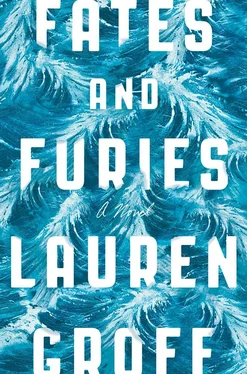“Well,” she said. “Another of my husband’s mourners, I see.”
Her husband, patron saint of failed actors. Because it was clear now that this boy was an actor. He had that cocksure carriage, the observant brightness. So many of them had shown up to touch the great man’s hem, but there was no hem left, Mathilde having given away or burned nearly everything, save the books and manuscripts. Only Mathilde was left, his homelier husk. The old wifey-wife.
“I never knew him. But you can say I’m a mourner, I guess,” the boy said, turning away to wipe his face. When he turned back, he was red, embarrassed. “I’m so sorry,” he said.
“I’ve made iced tea,” Mathilde heard herself say. “Wait here in the rocker and I’ll bring some.”
By the time she came back, the boy had calmed. Sweat curled the hair at his temples. She put on the overhead porch fan and set the tray down on the little table, taking a lemon bar for herself. She’d survived on wine and sugar for months because, fuck it, she never really got a childhood, and what was grief but an extended tantrum to be salved by sex and candy?
The boy-man picked up his tea and touched the tray, which she’d gotten in some rag-and-bone shop in London. He touched the herald and read aloud, “Non sanz droict.” He bolted up in his chair, spilling iced tea on his lap, and said, “Oh my god, that’s Shakespeare’s family—”
“Calm down,” she said. “It’s Victorian, a fake. He reacted exactly the way you did. He thought we had something that passed through old Willie’s hands and almost wet himself.”
“For so many years, I dreamt of driving up here,” the boy said. “Just to say hello. I dreamt that he’d invite me in and we’d have a nice dinner and talk and talk. I always knew we’d get along famously, he and I. Lancelot. And me.”
“His friends called him Lotto,” she said. “I’m Mathilde.”
“I know. The Dragon Wife,” he said. “I’m Land.”
With extreme slowness, she said, “Did you just call me the Dragon Wife?”
“Oh. Sorry. That’s what all the actors in the company called you when I was in Grimoire and One-Eyed King. Revival, not first-run. Of course, you’d know that. Because you protected him. You made sure he was paid on time, and kept people away, and you did it all while seeming so nice. I thought it was an honorific. Like, a joke you were in on.”
“No,” she said. “I was not in on this particular joke.”
“Whoops,” he said.
“It’s true,” Mathilde said, after some time. “I could breathe fire.”
She thought of how Lotto, in later years, had been called the Lion. With his dander up, he could roar. He looked leonine, too: his corona of white-shot gold, the fine, sharp cheekbones. He’d leap onstage, offended by some actor flubbing his precious lines, and there he’d pace, sleek and swift with his long lovely body, growling. He could be deadly. Fierce. The name was not inapt. But please, Mathilde knew lions. The male lolled beautifully, lazy in the sun. The female, less lovely by miles, was the one who brought back the kill.
The boy was sweating. His blue oxford shirt was hooped wetly under the arms. He was emitting a smell that was not unpleasant, exactly. It was a clean stink. Funny, she thought, looking over the banks of snapdragons to the river. Her mother had smelled of cold and scales, her father of stone dust and dog. She imagined her husband’s mother, whom she had never met, had a whiff of rotting apples, although her stationery had stunk of baby powder and rose perfume. Sallie was starch, cedar. Her dead grandmother, sandalwood. Her uncle, Swiss cheese. People told her that she smelled like garlic, like chalk, like nothing at all. Lotto, clean as camphor at his neck and belly, like electrified pennies at the armpit, like chlorine at the groin.
She swallowed. Such things, details noticed only on the edges of thought, would not return.
“Land,” Mathilde said. “Odd name for a guy like you.”
“Short for Roland,” the boy said.
Where the August sun had been steaming over the river, a green cloud was forming. It was still terrifically hot, but the birds had stopped singing. A feral cat scooted up the road on swift paws. It would rain soon.
“All right, Roland,” Mathilde said, suppressing a sigh. “Sing your song.”
Land told her what she already knew: actor. Had a recurring role on this soap opera, minor, but it paid the bills. “ The Starrs in Your Eyes? ” he said. “Heard of it?” He looked at her hopefully then grimaced. “I see,” he said. “Soaps aren’t your thing. Mine, either. It’s hackwork. But I got the job as soon as I got to the city. Fifteen years ago, literally the first audition I walked into. And it’s good money. And I can do plays in the summer when we don’t film.” He shrugged. “I’m not a superstar, but I work all the time. That’s a kind of success, I guess.”
“You don’t need to argue for the benefits of a steady gig,” she said. She felt reckless, disloyal. “Lotto never got one when he was an actor. It would have been an immense relief to have some pay coming in all those years. I worked my ass off and he made, maximum, seven thousand dollars a year until he started writing.”
“Thank god he started writing,” Land said. He told her that every birthday he took the day off to drive out to the beach and read The Springs. Lancelot never got his fair shakes as the genius he was.
“He would have agreed,” Mathilde said drily.
“But I love that about him. That arrogance,” Land said.
“I did, too,” Mathilde said.
The clouds like blackberry jam in the sky, faint double-boiler thunder from the north. All the things she could do, other than sit here, were gathering in the cool shadows of the house behind her, watching through the window. She was nailed to the chair.
She liked this boy, liked him enormously, more than anyone she’d met since Lotto died. She could just open her mouth and eat him he was so sweet; there was something easy about him, a gentleness she’d always loved in manly men.
“To tell you the truth, I wanted to meet you almost as much as I wanted to meet him,” Land said.
“Why?” she said. She was blushing. Flirting? It wasn’t impossible.
“You’re the untold story,” he said. “The mystery.”
“What mystery?” she said.
“The woman he chose to spend his life with,” Land said. “He’s easy to know. There are billions of interviews, and his plays come from him and give you a little window in. But you’re back in the shadows, hiding there. You’re the interesting one.”
It took a very long moment as they sat there on the porch, sweating in silence, for Mathilde to say to the boy, “I am not the interesting one.”
She knew she was the interesting one.
“You’re a bad liar,” he said.
She looked at him and imagined him in bed, those lovely fingers with the buffed nail beds, the neck with the visible cords, the strong jaw, that good body clear under his clothes, that sensitive face, and knew he’d be very good at fucking.
“Let’s go inside,” she said, and stood.
He blinked, startled. Then he stood and opened the door for her, following her in.
He was attentive, soft where he should be, strong under her arms. But there was something off. It wasn’t that she was so much older than he was; she estimated ten years. Fifteen, max. And it wasn’t that she didn’t know him, really. She hadn’t really known anybody she’d taken to bed with her the past six months. The absence of story was what she liked about them. But they were in the bathroom and she was watching his high-boned face behind her, his hand gripping her short hair, the other on her shoulder, and though it felt marvelous, she couldn’t focus.
Читать дальше












